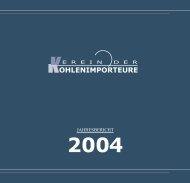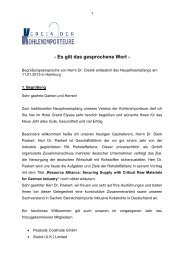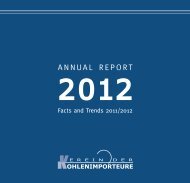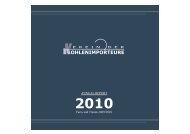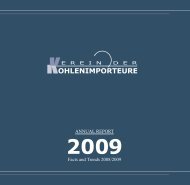Annual Report 2010 - Verein der Kohlenimporteure eV
Annual Report 2010 - Verein der Kohlenimporteure eV
Annual Report 2010 - Verein der Kohlenimporteure eV
Create successful ePaper yourself
Turn your PDF publications into a flip-book with our unique Google optimized e-Paper software.
with its extremely ambitious objectives in its Energy<br />
Concept, without having had a broad social debate about<br />
its consequences. It should acknowledge that today’s<br />
long-term objectives to 2050 cannot be a burden and<br />
should therefore be un<strong>der</strong>stood more as environmental<br />
policy wishes. Last but not least, the improved energyefficiency<br />
and energy-savings objectives appear almost<br />
Utopian, without drastic structural changes to existing<br />
production and consumption patterns. The Institute<br />
<br />
September 2011, comes to the conclusion that politicians<br />
should not rely on the, “vision of a massive drop in<br />
<br />
for the next 40 years should not rely only on optimistic<br />
assumptions”.<br />
The Association of German Scientists – <strong>Verein</strong>igung<br />
Deutscher Wissenschaftler (VDW) – comes to the<br />
conclusion that, “after examining the measures planned<br />
<br />
as to whether the objectives of the Energy Concept are<br />
achievable with these measures”.<br />
There is also the basic question of how so many<br />
detailed and rule-setting energy sector “objectives” are<br />
to be combined with a market economy? The narrow<br />
focus on renewable energies is even contrary to the<br />
self-proclaimed “open to technology” approach of the<br />
<br />
the energy mix. The clear primacy of climate protection<br />
is in contradiction with the energy policy triangle –<br />
security, affordability and sustainability – and their<br />
balance. All objections made against it so far have in<br />
substance remained valid.<br />
In addition to the economics of energy supply, security<br />
of supply is also un<strong>der</strong>rated in the Energy Concept. This<br />
can be seen in German electricity supply which, for the<br />
first time in its history, according to the energy scenarios,<br />
will rely from 2020 and beyond on increasingly massive<br />
imports. Thus, domestic power supply, which BDI has<br />
referred to with concern, “depends on conditions in<br />
foreign countries”. The power and influence of German<br />
energy policy will decrease to an extent unknown so far.<br />
The Energy Concept barely explains how, according to<br />
the energy scenarios, significant fossil energy imports<br />
can and should be secured, at least until 2020. The short<br />
section on “securing raw materials and international<br />
aspects” refers mainly to the EU level and supporting<br />
international infrastructure projects. Major challenges<br />
for security of energy supply thus remain unanswered.<br />
End of Hard Coal Production in 2018 Finally Agreed<br />
The end date for German hard coal mining has<br />
been sealed. The original proposal of the European<br />
Commission, published in July <strong>2010</strong>, that would have<br />
allowed state aid for hard coal mining across the EU<br />
only until October 2014, was in contradiction with<br />
the German law on financing hard coal mining that<br />
<br />
a regulation on a socially acceptable expiry date being<br />
agreed by the end of 2008, with a review clause in<br />
2012. The review was dropped from a draft law agreed<br />
at the beginning of 2011 on changes to the financing<br />
<br />
a European Commission decision that left no scope<br />
for an eventual review of the national decision to end<br />
coal production. State aid to the remaining five mines,<br />
according to the EU decision, may only continue if, for<br />
each mine, a definitive, irreversible date for closure is<br />
established in a closure plan.<br />
The Spanish coal industry introduced a complaint<br />
against the European Commission’s decision of 10<br />
<br />
of Justice, according to which state aid had already<br />
been approved for not only the German, but also for<br />
the Spanish hard coal mining industry, with the same<br />
objective of a definite end to uneconomic Spanish<br />
hard coal mining. No hard coal mines will be closed in<br />
Germany in 2011. Only in mid 2012, with Saar mine<br />
53



